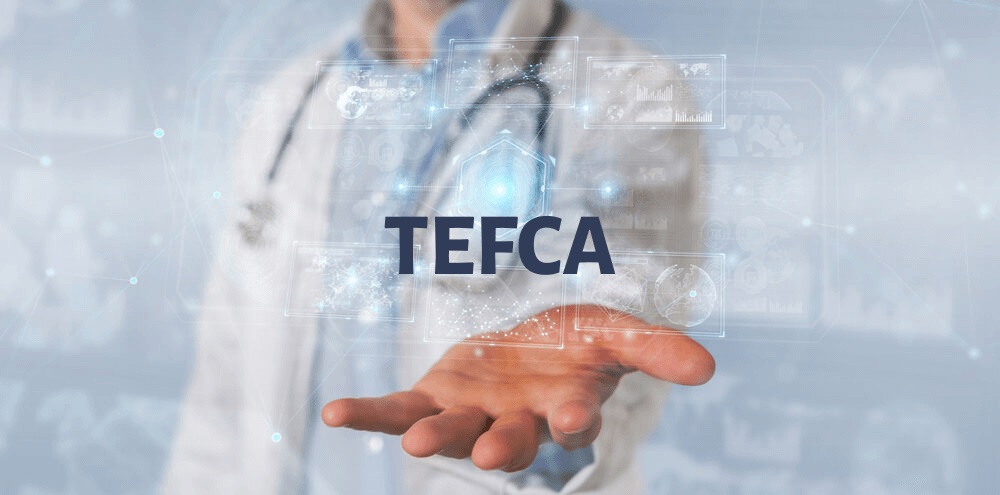
The Department of Health and Human Services (HHS) and the Office of the National Coordinator for Health Information Technology (ONC) have designated CommonWell Health Alliance and Kno2 as Qualified Health Information Networks (QHINs) under the Trusted Exchange Framework and Common Agreement (TEFCA). This designation signifies a crucial step towards nationwide health data interoperability, expanding the network of entities capable of securely exchanging health information. The development of TEFCA, in collaboration with The Sequoia Project, Inc., reflects a concerted effort to drive interoperability, supported by the enactment of the 21st Century Cures Act. Moving forward, the adoption of Common Agreement Version 2.0, incorporating HL7 FHIR-based transactions, promises further advancements in data exchange capabilities, fostering improved care delivery and patient outcomes.
Health data exchange in the United States took a significant step forward as the Department of Health and Human Services (HHS), in collaboration with the Office of the National Coordinator for Health Information Technology (ONC), designated two additional organizations as Qualified Health Information Networks (QHINs) capable of operating within the Trusted Exchange Framework and Common Agreement (TEFCA). With this designation, CommonWell Health Alliance and Kno2 are now empowered to facilitate health data exchange under the policies and technical requirements outlined in the Common Agreement, joining the ranks of other designated QHINs.
This development marks a culmination of a multi-year, collaborative effort between public and private entities, spearheaded by ONC alongside The Sequoia Project, Inc., the Recognized Coordinating Entity (RCE) for TEFCA. Envisioned as a key component of the 21st Century Cures Act to promote nationwide interoperability, TEFCA commenced operations in December 2023 with the initial designation of five QHINs: eHealth Exchange, Epic Nexus, Health Gorilla, KONZA, and MedAllies.
QHINs serve as the cornerstone of the TEFCA network-to-network exchange, offering shared services and governance structures to securely route queries, responses, and messages across disparate networks for various stakeholders within the healthcare ecosystem, including patients, health systems, providers, hospitals, payers, and public health agencies.
Micky Tripathi, Ph.D., the national coordinator for health IT, underscored the significance of the expanded QHIN designation, stating, “These additional QHINs expand TEFCA’s reach and provide additional connectivity choices for patients, health care providers, hospitals, public health agencies, health insurers, and other authorized health care professionals.” Tripathi also extended congratulations to CommonWell Health Alliance and Kno2 for their accomplishment.
Looking ahead, the development of Common Agreement Version 2.0 is underway, incorporating updates that will mandate support for Health Level Seven (HL7) Fast Healthcare Interoperability Resources (FHIR)-based transactions. QHINs are expected to adopt these updates within the first quarter of 2024, further enhancing the interoperability landscape and facilitating seamless health data exchange.
Mariann Yeager, CEO of The Sequoia Project and lead of the RCE, emphasized the significance of these new QHIN designations, noting, “The designation of these two QHINs, which brings the total number of QHINs to seven, highlights the rapid expansion of TEFCA exchange and the support of more and more leaders around TEFCA exchange.” This expansion underscores the growing momentum behind TEFCA and signifies a critical milestone in advancing nationwide health data interoperability.
As CommonWell Health Alliance and Kno2 join the ranks of Qualified Health Information Networks (QHINs) under TEFCA, the healthcare industry inches closer to achieving seamless interoperability and data exchange. This milestone underscores the commitment of stakeholders to overcome barriers and drive innovation in healthcare delivery. With the expansion of TEFCA, patients, providers, payers, and public health agencies gain access to a robust infrastructure for sharing critical health information securely. Looking ahead, continued collaboration and adoption of emerging standards will be essential to sustain momentum and realize the full potential of health data interoperability. Through these collective efforts, TEFCA paves the way for a transformative healthcare landscape characterized by enhanced connectivity, efficiency, and improved patient outcomes.
